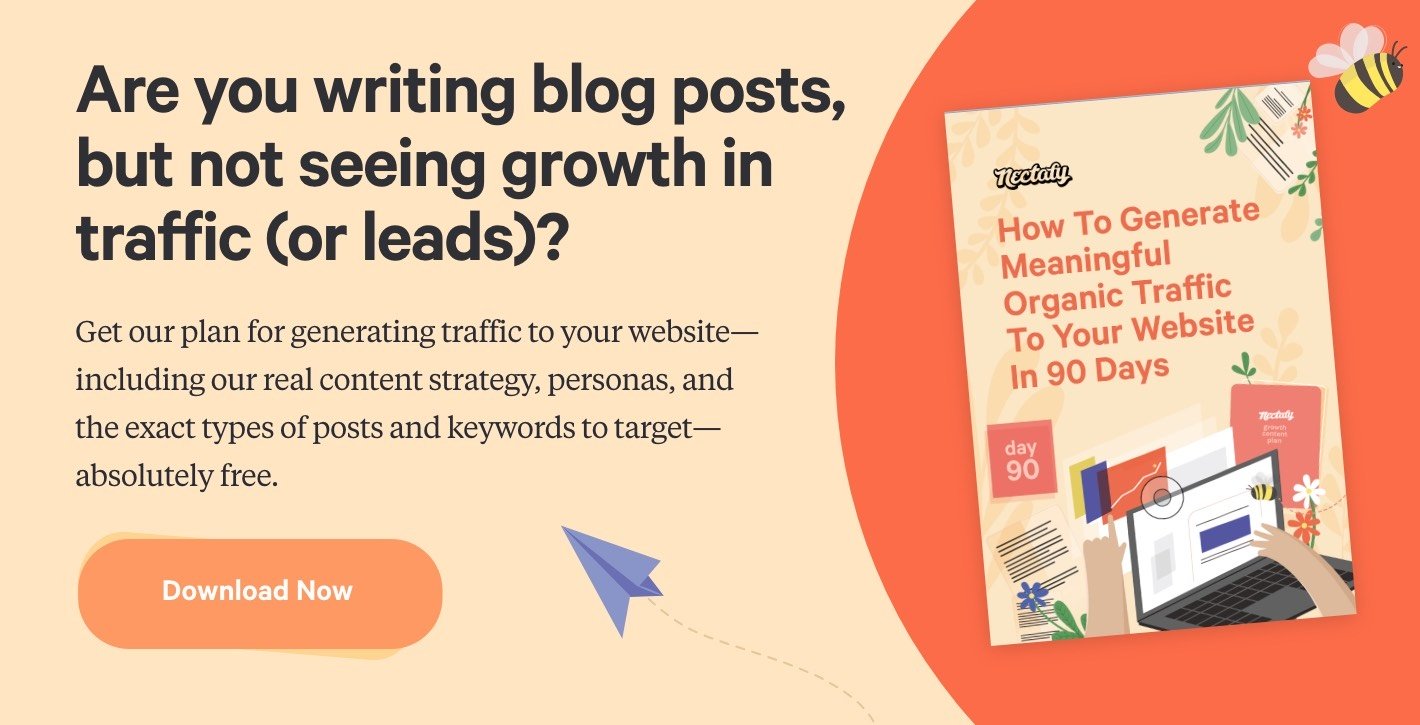The Most Important Factor In Your Keyword Rankings [STUDY]


![The Most Important Factor In Your Keyword Rankings [STUDY]](https://www.nectafy.com/hubfs/Images/Blog/The%20Most%20Important%20Factor%20In%20Your%20Keyword%20Rankings%20%5BSTUDY%5D%20-%20Nectafy.jpg)
If you are blogging and blogging, and not seeing any new keyword rankings or visitors, there is one place to look: the average time on page for your blog posts.
Here’s how it works:
- Google wants to serve up the best results for keywords, and there is a lot of competition for each keyword.
- Therefore, only the highest-quality blog posts rise into the top 10 positions, or Google’s first page of results.
- The best website metric available for “quality” is time on page.
In this article, you will learn about the important correlation between time on page and keyword rankings. If you want lots of high keyword rankings on page one of Google, focus most on the quality of information delivered for the intended audience in each blog post.
The Dataset
We looked at over 2,000 blog posts across 11 B2B websites (Nectafy and ten of its clients). Here are all of the blog posts organized by average time on page.
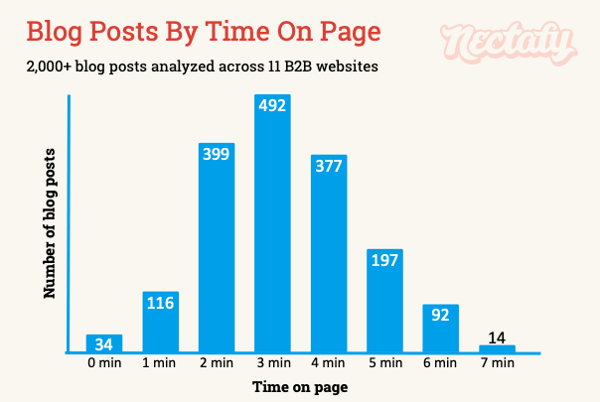
We get our data from HubSpot, which defines the metric here.
Time on page: the average amount of time spent on a page. This is calculated by taking the sum of all page view durations divided by the total page views. This calculation excludes exits.
What did we analyze?
- 11 B2B companies
- 2,002 unique blog posts
- Each has a minimum of 100 page views
- We removed the outliers—posts with 8, 9, 10, and 11 minutes of time on page, since there were fewer than 10 posts in each group
- 8,824 keywords on page one of Google
- 9 million+ page views
Impact On The Quantity Of Keyword Rankings
Our first takeaway from studying these 2,000 blog posts is that time on page correlates with the number of keyword rankings on page one of Google. Take a look at the chart:
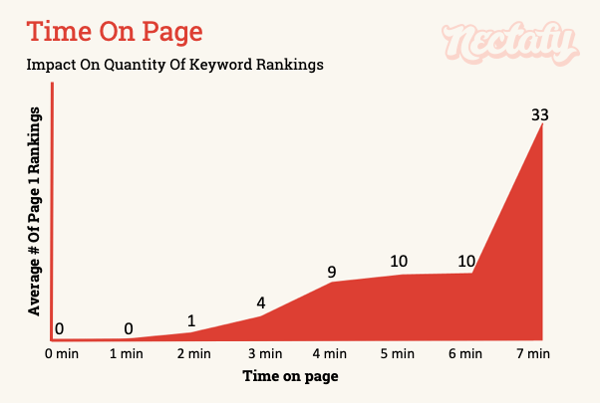
Takeaways
- Blog posts with zero- or one-minute average time on page have no keyword rankings whatsoever. (They failed.)
- Blog posts with 7 minutes average 33 different rankings on page one (or 33 different ways for people to search and find your company).
- If you want more keywords on page one of Google, improve the average time spent on your blog posts.
See Also: How To Use SEMrush For Keyword Research: 18 Strategies To Pursue
Impact On The Quality Of Keyword Rankings
Our second takeaway is that time on page correlates with the position your keywords will rank on page one of Google. If you rank in spot #10 you are the last position on page one, and if you rank #1 you are the top position for organic results. So in this chart, the lower number is better. Take a look:
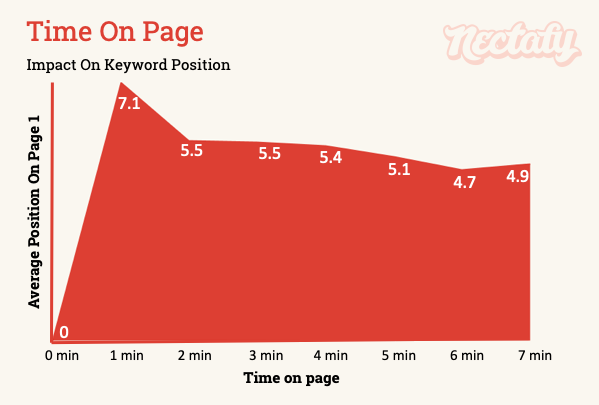
Takeaways
- Blog posts with no time on page (people don’t stay around to read them) have no keyword rankings whatsoever. (They failed.)
- As the minutes go up, the rankings on Google’s page one increase.
- If you want keyword rankings that are higher up on page one of Google, improve the average time spent on your blog posts.
See Also: How To Generate $1.1 Million In Sales With Growth Content
Where To Find Your Data
If you use Google Analytics, HubSpot, or a similar marketing automation tool for your company’s website, you can find this data pretty easily. Here’s how:
- Google Analytics: Behavior > Site Content > All Pages
- HubSpot: Reports > Analytics Tools > Traffic Analytics > Pages
You don’t even need to do a full analysis to determine the impact of time on page on your results. Simply sort your pages from most views to least views. Are your highest most-viewed posts and pages also viewed for the longest length of time?
In this blog post about growth content tactics that drove a 647% return on investment, we highlighted how you can see the power of time on page without having to crunch any numbers.
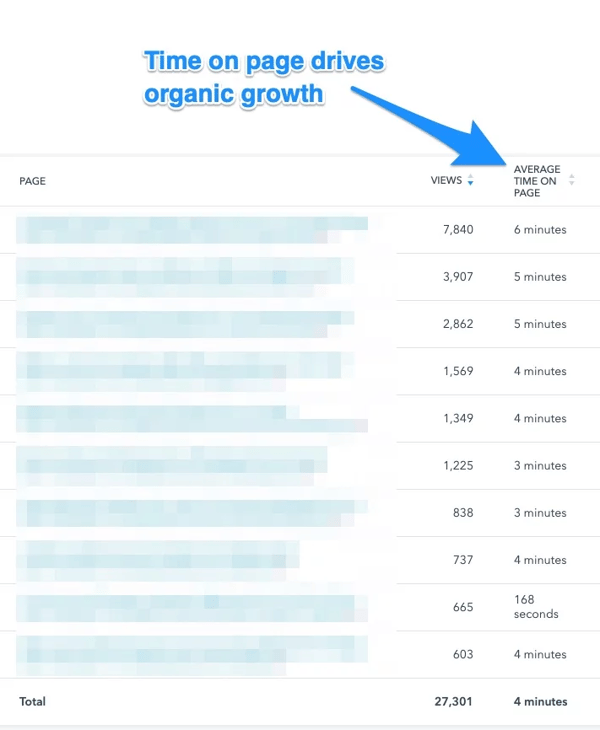
See Also: The Anatomy & ROI Of A One Million-View Blog Post
How To Improve Your Time On Page (& Content Quality)
If you’ve made it this far, you’re likely convinced that time on page is an important metric to keep an eye on if you’d like your company’s blog to drive more results.
Here are the first few steps to take to improve your time on page metric.
- Pick topics that you have expertise on. If you (or someone at your company) knows a topic really well, imparting their knowledge will be more helpful to your readers, who will invariably spend more time on the page.
- Interview subject matter experts for each topic. Don’t leave writers out on their own to try to become experts on a topic in a few hours. It won’t work and the reader will choose to leave after less than a minute. Instead, pair a subject matter expert with a writer for each topic.
- Google the keyword phrase or topic before you start writing. Look at the current results on page one. How well are they written? What can you offer that is different and better?
- Write longer-form content. If you have a really well-written 500-word piece, maybe someone will stay around for two minutes. If you have 2,000 words of well written content, maybe they’ll stay around for four or five minutes. However, make sure it’s always quality! If you write 2,000 fluff words, it won’t improve your time on page.
There are many more ways to improve your content quality but if you put these practices in place first, you’ll see an increase in time on page and therefore results in the coming months.
One Last Thought...
Put aside how Google measures quality for a second. Let’s say you were able to get thousands of people to view a blog post with a low time on page. That might look good in your pageview numbers, but it still won’t improve business results. Readers won’t be compelled to keep looking around your site if the post they just read isn’t useful.
For Google’s sake (and more importantly, the sake of your target audience), focus on the quality of your content. Measure it with time on page. And watch the results grow.

